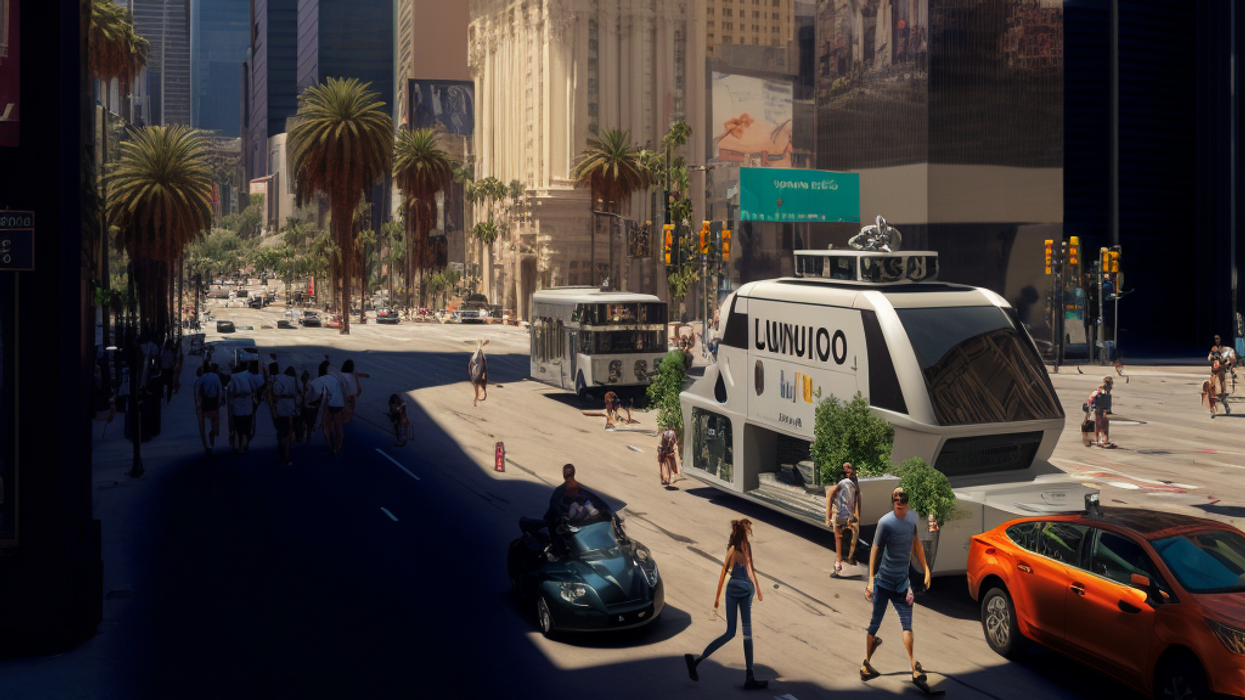It’s 8 a.m. on a Monday morning. I wave at the contact-free traffic sensor and the cars stop so I can cross. A delivery robot zooms past bringing cold brew and breakfast burritos to neighbors, while someone activates a micromobility electric scooter and glides off down a side street. An autonomous vehicle on a trial run pauses at the stop sign, guided by Global Positioning System satellites more than 12,000 miles overhead. A smart pole tracks air quality at the intersection and reports back to the data science team at City Hall.
At the “smart” bus stop I press a button and an AI swiftly triangulates incoming Metro Los Angeles GIS (Geographic Information System) data before a synthesized voice reads out wait times. I jump on the bus when it arrives, using my Tap card to pay the fare and grab a seat, plugging my charger into the (under seat) USB port. Thanks to the bus’s persistent WiFi signal en route, I pull up the latest technology report from the Harvard Business Review, courtesy of the L.A. Public Library, and start making notes.
Twenty minutes later and I'm the first one walking into my co-working space. As soon as I swipe my entry card the centralized system detects a change in the motion sensor network. It then turns on the lights, ambient music, and HVAC (heating, ventilation and AC) , ensuring the building remains energy efficient and to code when unoccupied.
 Midjourney/Dall-E
Midjourney/Dall-E
The 2028 Plan
In December 2020, when the SmartLA 2028 city plan was released by (the now former) Mayor Garcetti’s office, this sort of scenario felt far-off.
But it’s all there in the document: a plan to turn L.A. from reliance on fossil fuels and cars and into a data-driven connected city, which addresses the digital divide and brings fresh ideas, including telehealth, clean tech and a switch to mass transit.
What no one knew, when they started working on this plan back in 2019, was a global pandemic was on its way. It took that pandemic to throw everyone into a digital-ready future earlier than (everyone) expected. But here we are.
“Throughout the crisis, digital tools have emerged as a critical lifeline for our society,” notes the SmartLA 2028 city plan. “Enabling contact-free essential services, accelerated medical solutions, artificial intelligence (AI)-assisted policy making, protest coordination through social media, real-time community engagement and a scale and pace of innovation previously unthinkable.”
LA and the Future of Everything
Let’s back up a moment, to the 1950s when L.A. first looked like The Future to the rest of the world.
Post-war industries flourished here. The Federal-Aid Highway Act (1956) ushered in the freeway system and cars poured off the manufacturing lots. Cold War NASA missions heralded an aerospace boom. The Case Study House Program showcased prefabricated components and modern appliances. Bold sci-fi style buildings such as The Chemosphere House (1960) and LAX’s Theme Building (1961) materialized on the landscape. L.A. County’s population tripled between 1940 (2.7 million) to over 6 million by 1960.
In 2023, our population is now north of 10 million and, as a result, this new L.A. Future plan is less about appearances, and more about a skillful cloud-based hyper-connectivity providing a vast mesh of advanced technologies which aim to make this city sustainable, livable and equitable for all.
Sure, we’ve got Big Tech from Up North on our doorstep. The FAANG companies (Facebook, Apple etc.) have carved out nearly 6 million square footage of L.A. westside alone, and obviously they contribute massively to our economy. But a fairer L.A. will depend less on unicorns (startups with a $1 billion valuation before public listing) and more on a needs-based cohesive approach to innovation, drawing on the best resources from academic institutions, updating local government departments across the board, and bringing both the venture capital community and its well-funded startups into alliance with real-world requirements.
Along these lines, Miki Reynolds, CEO and co-founder of Grid110, the L.A. tech hub, wants to ensure a spirit of egalitarianism is carried through into L.A.’s startups.
"The L.A. startup scene is more than just Venice and Santa Monica," says Reynolds, who prefers a cityscape and initially headquartered Grid110 in DTLA as a result. "Since our inception, we've supported 250 companies who have raised over $90M in investment capital. But I'm even more proud to say 70 % of our portfolio companies have founders who are women and 75% are founders of color. L.A. is an incredibly rich and diverse city - we need to reflect that in our emerging technology."
A welcome sign is that many L.A. technology companies have joined PledgeLA, an industry-wide initiative to make the tech sector accountable to its communities, establishing goals around diversity and social impact, and recording their progress.
 Midjourney/Dall-E
Midjourney/Dall-E
Technology For Good
So how will L.A. ensure its tech-enabled future is providing value for all? The SmartLA 2028 city plan laid out some bold objectives, with measurable outcomes including a 10% reduction in travel time by utilizing data from 40,000 loop detectors across 4,500 connected intersections and annual savings of $3 million through converting over 165,000 street lamps to LED and connecting them to a dashboard to streamline maintenance and track outages.
The MyLA311 site and mobile app allow Angelenos a simple-to-use interface to city services. It's relatively unsophisticated in terms of UX (user experience) and design, but it works because it was created with equity in mind so everyone can use it. If you need to report a pothole, civic safety issue, schedule pick-up of bulky items or find the nearest municipal building or park, it’s all there - and available in English, Spanish, Korean, Armenian and Chinese (simplified and traditional) to reflect our diverse communities.
MyLA311 would not have been possible, however, without the Los Angeles Open Data project. This is the result of over 7 years of capturing, standardizing, centralizing and then analyzing vast amounts of city data - from almost every department - transportation, sanitation, public safety (crime stats), housing, infrastructure and health (most notably COVID-19 transmission data).
The Los Angeles Open Data’s main function is to provide data and analysis support to city programs which aim to realize high-value community outcomes by providing policy recommendations. Simply put - if you don’t know where you’re starting from (base line), how will you know if a program is a success?
But it’s also entirely open and accountable to the public too. As a result, Angelenos can now drill down to find out more on hyperlocal data sets which provide meaning to them. For example, a team scraped data on Black-owned businesses in L.A. and compiled a “story map” here, so people can choose to spend money within their communities and support causes most meaningful to them.
This data also powers ideas which have emerged from the Innovation and Performance Commission (IPC), an open forum for city employees to propose pilot projects which can receive allocations from a $1 million fund. According to the SmartLA 2028 report, “Since its inception in 2016, over 40 projects have been funded, including a mobile nurse practitioner unit that reduces emergency room visits, employee payroll app that reduces paper and staff resources, and 3D printers for rapid prototyping of public works projects.”
Connectivity Access
All these initiatives are vital to the running of a “smart city” - but what’s the use if a significant proportion of the population doesn’t have access to digital connectivity?
This situation was exacerbated by the pandemic and many agencies stepped up to close up the digital divide, including Get Connected Los Angeles, where the city partnered with the California Emerging Technology Fund and EveryoneOn to help Angelenos get access to computers, digital literary services and low-cost internet connectivity.
The Los Angeles County Library extended their Wi-Fi service to over 60 of its local branch parking structures so locals could “park and connect” (or “sit and connect” at nearby outdoor seating) to pick up email, do homework, or carry out job searches. While the Los Angeles Public Library rolled out its Tech2go Hotspot Loan to library card holders in good standing and re-trained staff to act as “cybernauts” and offer technology assistance.
Imagining the Future
With all these tech-future equitable concepts in place, what will L.A. look like in 2028 when the world arrives on our doorstep for the Olympics?
At first glance - and this is no bad thing - it might not look that different at all, because no new construction/venues will be built, according to the official Games Plan. We have enough facilities to host the Games. In a bid for sustainability and imaginative adaptive reuse, the plan is clear on that score.
But what will be entirely revolutionary is the technologically-based infrastructure enabling everyone to get around, connect, find out what’s going on, and enjoy the sporting and cultural events. As 15,000 athletes arrive at LAX they’ll take the automated people mover to the Metro and end up at the Olympic Village (UCLA) in no time. With the smart city layer in place, anything is possible - augmented reality glasses overlaying real-time sports scores, holograms of athletes participating in community-led training sessions, multi-lingual robots acting as guides and scanning tickets at turnstiles.
It all starts with the data - and L.A. is already way ahead of the game on that score.
From Your Site Articles
Related Articles Around the Web



 Midjourney/Dall-E
Midjourney/Dall-E Midjourney/Dall-E
Midjourney/Dall-E

 Image Source: Skyryse
Image Source: Skyryse
 Image Source: Northwood Space
Image Source: Northwood Space